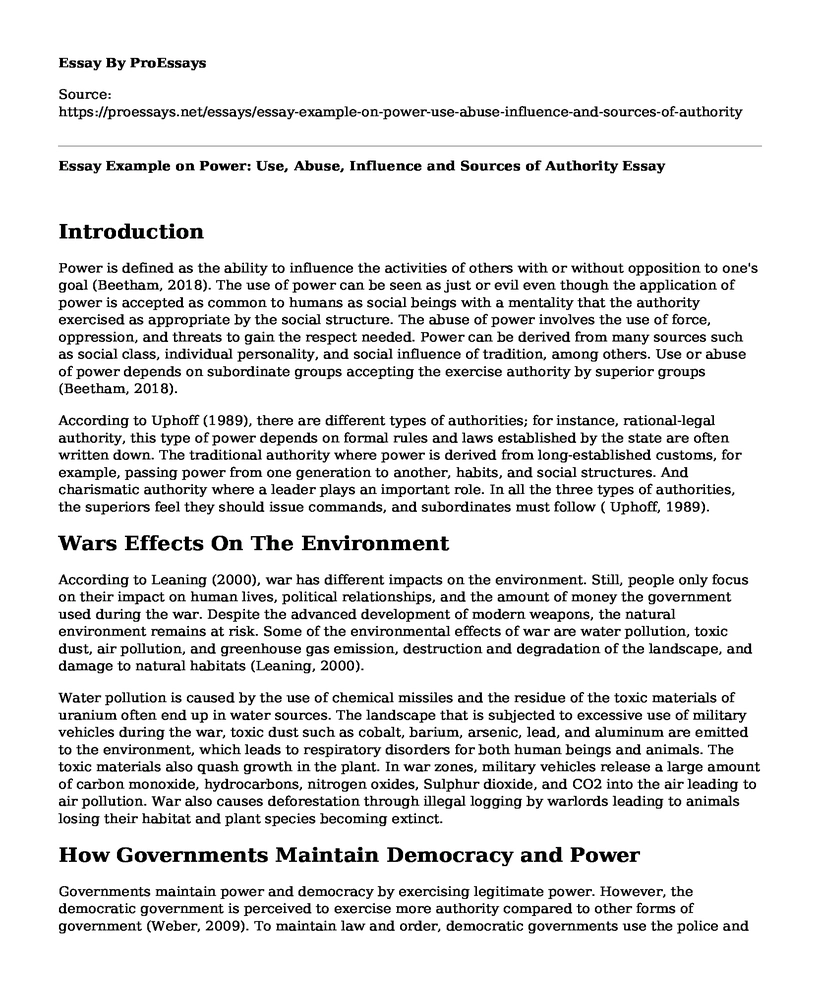Introduction
Power is defined as the ability to influence the activities of others with or without opposition to one's goal (Beetham, 2018). The use of power can be seen as just or evil even though the application of power is accepted as common to humans as social beings with a mentality that the authority exercised as appropriate by the social structure. The abuse of power involves the use of force, oppression, and threats to gain the respect needed. Power can be derived from many sources such as social class, individual personality, and social influence of tradition, among others. Use or abuse of power depends on subordinate groups accepting the exercise authority by superior groups (Beetham, 2018).
According to Uphoff (1989), there are different types of authorities; for instance, rational-legal authority, this type of power depends on formal rules and laws established by the state are often written down. The traditional authority where power is derived from long-established customs, for example, passing power from one generation to another, habits, and social structures. And charismatic authority where a leader plays an important role. In all the three types of authorities, the superiors feel they should issue commands, and subordinates must follow ( Uphoff, 1989).
Wars Effects On The Environment
According to Leaning (2000), war has different impacts on the environment. Still, people only focus on their impact on human lives, political relationships, and the amount of money the government used during the war. Despite the advanced development of modern weapons, the natural environment remains at risk. Some of the environmental effects of war are water pollution, toxic dust, air pollution, and greenhouse gas emission, destruction and degradation of the landscape, and damage to natural habitats (Leaning, 2000).
Water pollution is caused by the use of chemical missiles and the residue of the toxic materials of uranium often end up in water sources. The landscape that is subjected to excessive use of military vehicles during the war, toxic dust such as cobalt, barium, arsenic, lead, and aluminum are emitted to the environment, which leads to respiratory disorders for both human beings and animals. The toxic materials also quash growth in the plant. In war zones, military vehicles release a large amount of carbon monoxide, hydrocarbons, nitrogen oxides, Sulphur dioxide, and CO2 into the air leading to air pollution. War also causes deforestation through illegal logging by warlords leading to animals losing their habitat and plant species becoming extinct.
How Governments Maintain Democracy and Power
Governments maintain power and democracy by exercising legitimate power. However, the democratic government is perceived to exercise more authority compared to other forms of government (Weber, 2009). To maintain law and order, democratic governments use the police and military. The practice is legitimate to use of violence, and the right for self-defense that is authorized by the state is also an abuse of power since those using deadly force can opt for other options like interventions by another individual. Democratically elected governments tend to use the idea of the modern state, where a political community has administrative and legal orders created (Weber, 2009). There is also a binding authority over its citizens and jurisdiction its actions. And in the modern state, those in power possesses the legitimate right to exercise physical force in its jurisdiction. The use of rational-legal authority is a way that many governments maintain power and democracy since a ruling regime is largely tied to legal rationality, legal legitimacy, and bureaucracy (Weber, 2009).
References
Beetham, D. (2018). Max Weber and the theory of modern politics. John Wiley & Sons. Retrieved from https://scholar.google.com/scholar?hl=en&as_sdt=0%2C5&q=theory+of+max+weber&oq=max+weber+power
Leaning, J. (2000). Environment and health: 5. Impact of war. Cmaj, 163(9), 1157-1161. Retrieved from https://www.cmaj.ca/content/163/9/1157.short
Uphoff, N. (1989). Distinguishing power, authority & legitimacy: Taking Max Weber at his word by using resources-exchange analysis. Polity, 22(2), 295-322. Retrieved from https://www.journals.uchicago.edu/doi/abs/10.2307/3234836
Weber, M. (2009). The theory of social and economic organization. Simon and Schuster. Retrieved from https://scholar.google.com/scholar?hl=en&as_sdt=0%2C5&q=theory+of+max+weber&oq=max+weber+power
Cite this page
Essay Example on Power: Use, Abuse, Influence and Sources of Authority. (2023, May 23). Retrieved from https://proessays.net/essays/essay-example-on-power-use-abuse-influence-and-sources-of-authority
If you are the original author of this essay and no longer wish to have it published on the ProEssays website, please click below to request its removal:
- Argumentative Essay: A Leader Is Best Judged by the Well-Being of the People in His Country
- Separation of Illegal Families Annotated Bibliography
- Essay Sample on Russian Foreign Policy Motivations in the Ukraine Crisis of 2014
- Essay Example on Comparing Plato's Cave to The Matrix: Reality and Perception
- Regulatory Takings: A Constitutional Right of Private Property Owners - Essay Sample
- Free Paper: Methods and Theories of Art History
- The Kansas-Nebraska Act: Fueling Sectional Crisis and Civil War Dynamics - Report Example







